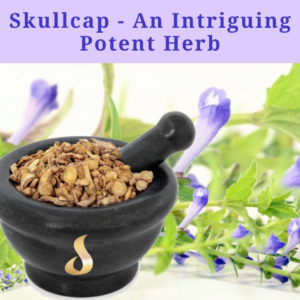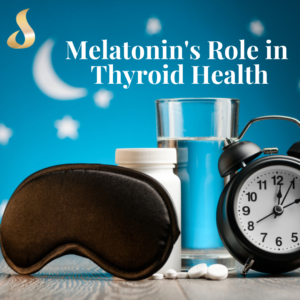What's On This Page?
ToggleHave you ever woken up in the middle of the night feeling like you’ve had a full night’s sleep, only to realize it’s been just two hours? This rare phenomenon, called sleep compression, happens to me occasionally after taking my Chelated Magnesium and Immune Script at bedtime. It’s not insomnia—far from it! It’s like your body compresses the restorative effects of 8 hours of sleep into just a few.
This intriguing effect comes from one of my favorite ingredients in Immune Script: Chinese skullcap, an incredible herb with multitasking superpowers. It’s a powerhouse for relaxation, immune support, and much more. Occasionally, skullcap can cause this compressed, hyper-refreshing sleep cycle. It’s rare, fascinating, and completely safe—just another example of how potent this herb really is.
During the COVID-19 days, many turned to Chinese skullcap because of its ability to inhibit inflammatory factors like IL-6 and IL-1β. It also activates pathways like MAPK and NF-κB, which increase IL-17 production, enhancing immune responses in the lung, gut, and skin. But beyond immune health, its benefits extend to relaxation, sleep support, and even allergy relief.
Skullcap is the multitasking overachiever of the plant world, which is why I added it to Immune Script®. I’ll never be without it. Need relaxation and sleep? Skullcap’s got you. Struggling with allergies? No problem. Battling bacteria, viruses, or even the big bad Borrelia? Skullcap says, “Hold my chlorophyll—I’m about to do something ridiculous and impressive!”
Look up skullcap later—it has countless benefits beyond its sedative properties. While you’re at it, check out andrographis, olive leaf, EpiCor®, and resveratrol—you’ll feel like you’re assembling the Avengers of the botanical world. They’re all in Immune Script.
If this midnight wake-up call sounds familiar, you’re not alone—and there’s an explanation for this cool phenomenon! Before I dive into what causes sleep compression, I want to emphasize that it’s completely different from insomnia.
While sleep compression and insomnia might seem similar because you wake up before a full night’s rest, they couldn’t feel more different. With sleep compression, you wake up refreshed and energized, even after just a few hours, because your body efficiently hits the deep, restorative stages of sleep. It’s like your sleep is hyper-productive, leaving you ready to tackle the day—even if it’s still the wee hours.
Insomnia, on the other hand, is the complete opposite. Even if you manage to sleep, it’s shallow, fragmented, and misses the restorative phases. You wake up feeling tired, foggy, and irritable, dragging through the day without the benefits of proper rest. The key difference? Sleep compression leaves you feeling refreshed and ready, whereas insomnia leaves you feeling drained and sleep-deprived.
 9 Compounds That Cause Sleep Compression
9 Compounds That Cause Sleep Compression
Let’s call this phenomenon restorative sleep compression. While it’s not an official term in sleep medicine, it’s the perfect way to describe the sensation of achieving full rejuvenation in a fraction of the usual time.
Other than skullcap herb which I’ve mentioned above, 5 other natural compounds enhance deep sleep. Any of these can rapidly induce a restorative sleep compression state leading you to wake up early and feel like you slept all night!
- Melatonin – Can enhance early sleep stages, sometimes causing premature awakenings with a feeling of rest.
- Benzodiazepines or Z-Drugs (e.g., Ambien) – Promote sedation and deepen sleep early on, potentially compressing restorative phases.
- L-Theanine – Calms the mind and may facilitate deep sleep bursts, leading to a feeling of efficient rest.
- Magnesium – Supports deep sleep induction, sometimes creating the sensation of shorter yet restorative rest.
- Valerian Root – Enhances GABA signaling, promoting deep and efficient sleep, especially in sensitive individuals.
- 5-HTP – Can accelerate melatonin production, leading to compressed deep sleep cycles.
- Tryptophan – Helps quickly shift into deep sleep due to its role in serotonin and melatonin synthesis.
- Phenibut – Strong GABAergic effects can cause rapid deep sleep, mimicking sleep compression.
4 Reasons Why Restorative Sleep Compression Happens
Restorative sleep compression describes when you feel fully rested after an unusually short period of sleep. While it might sound like a superpower, it’s not always a sign of optimal health. True rest involves multiple sleep stages, including deep sleep and REM sleep, all of which serve distinct restorative purposes.
Here are the top four reasons behind this unusual sleep phenomenon:
- 1. Time Distortion in Sleep:
During deep or REM sleep, your brain’s perception of time can become distorted. If you achieve these phases quickly, it might feel like hours have passed when it’s only been a short while. - Sleep State Misperception:
Some people experience a disconnect between how they think they’ve slept and how they’ve actually slept. While this is often associated with insomnia, the reverse is also possible – you may feel as though you’ve had a full night’s sleep when it was only a brief, highly efficient rest. - Hypersynchronous Deep Sleep:
Certain substances, like supplements or medications, can enhance the depth of your sleep, concentrating the restorative effects into a shorter window. This might explain why people with sleep compression wake up feeling refreshed after just a couple of hours. It’s definitely how I feel when it happens to me. - Hyper-efficient Sleep Cycles:
While not an official medical term, hyper-efficient sleep describes people who compress the benefits of sleep into shorter-than-average durations, for example 3 to 4 hours of sleep a night. Their body compresses their restorative sleep stages into shorter periods. This is known as “short sleep syndrome” and may be attributed to agenes like the DEC2 (BHLHE41) gene which regulates the circadian rhythm and amount of sleep required. A mutation here may alter the need for sleep, allowing some individuals (for example, Donald Trump) to feel fully rested after only 4 hours of sleep.
I don’t have this gene, I need to sleep at least about 7 each night in order to feel well in the morning. But people with the gene (that have short sleep syndrome) are not fatigued during the day, and have normal cognitive function. They’re just naturally wired for reduced sleep requirements. This isn’t a disruption, it’s just their “normal.”
How Medications and Supplements Impact Sleep Compression
Medications and supplements can have profound effects on your sleep architecture, sometimes creating the illusion of restorative sleep compression—or, in some cases, outright disrupting your rest. Here’s how common sleep aids might fit into this picture:
Prescription Sleep Drugs:
Drugs like zolpidem (Ambien), temazepam (Restoril), and alprazolam (Xanax)
- belong to classes of medications that act on GABA receptors in the brain, much like Chinese skullcap, lavender or chamomile herbal supplements:
- Induce rapid, deep sleep, compressing the early stages of rest.
- Lead to rebound awakenings or light sleep later in the night due to their short half-life or withdrawal effects.
- Cause vivid dreams or nightmares in sensitive people. Speaking of dreams, you may be interested in my other article, 12 Amazing Facts About Nightmares and Dreaming. In it you will learn how asthma, PTSD and even feeling guilty can lead to bad dreams!
While they may feel effective in the short term, they don’t always allow for a balanced progression through sleep stages, particularly REM sleep.
Melatonin:
Melatonin helps regulate circadian rhythms, making it easier to fall asleep. For some, it might fast-track entry into deep sleep, leading to the sensation of compressed rest. Melatonin’s found in food by the way. If you want to know what foods contain it, CLICK HERE. However, it doesn’t typically disrupt your sleep architecture as long as it’s used in appropriate doses (often under 3 mg). Check out this article, 4 Ways to Navigate Sleep Challenges: Melatonin’s Role in Thyroid Health.
Over-the-Counter Antihistamines (e.g., Diphenhydramine):
Common in medications like Unisom® or sleep aids like ZzzQuil, diphenhydramine can induce drowsiness and deep sleep but often leads to grogginess upon waking. These drugs suppress histamine as you know (that’s how they work on allergies), and in doing so they induce sleep. But these drugs are unlikely to cause restorative sleep compression and may interfere with REM sleep.
Diphenhydramine is mentioned as one of the medications that can slow your stomach from emptying (similarly to Ozempic®), and I talk about it as well as other medications in my other article, Top 5 Medications Linked to Gastroparesis and How to Spot the Symptoms.
Natural Supplements (e.g., Skullcap, Chamomile, Valerian, L-Theanine):
These herbs and amino acids can enhance the depth of your sleep. For sensitive individuals, they may compress the early stages of sleep and create a sense of full restoration in less time. These herbs are very calming to the body and mind, in fact, I talk about some of them in this article, 8 Natural and Conventional Medicine for Obsessive Thoughts.
Does Sleep Compression Mean You’re Fully Rested?
Not necessarily. While it’s great to wake up feeling refreshed, true rest involves a complete progression through all sleep stages, including light sleep, deep sleep, and REM. Shortened sleep cycles might leave your body missing out on essential processes like memory consolidation, emotional regulation, and physical repair.
If this phenomenon happens regularly or disrupts your overall sleep quality, it’s worth consulting a sleep specialist. Remember, I’m a pharmacist, not a sleep doctor, so take this as accurate advice—not a definitive diagnosis.
A Quick Note on Alcohol
Unlike supplements or medications that might promote restorative sleep compression, alcohol typically disrupts sleep architecture. It may make a person initially sleepy, but then after that part wears off, you may have restless uncomfortable sleep, and possibly trips to the bathroom to urinate. Here’s what it does:

-
- Initial Sedation: Alcohol can knock you out quickly, mimicking the feeling of deep sleep.
- REM Suppression: During the first half of the night, alcohol suppresses REM sleep, the stage linked to dreaming and emotional health. Read about REM sleep at the Cleveland Clinic’s WEBSITE.
- Rebound Fragmentation: As your body metabolizes the alcohol, you’re likely to experience lighter, fragmented sleep later in the night.
- Increased Nighttime Urination: Alcohol suppresses antidiuretic hormone (ADH), which normally helps your kidneys retain water. This suppression increases urine production, leading to more frequent nighttime trips to the bathroom, further disrupting your sleep cycle. While alcohol may feel like it’s helping you sleep better, it’s not promoting true restoration. Over time, this can lead to chronic sleep disruptions.
The Takeaway
Restorative sleep compression is a fascinating phenomenon that may occur due to enhanced deep sleep, time distortion, or medication (or supplement) side effect. Sure, waking up feeling like you’ve conquered the night after just two hours might seem magical, but don’t start scheduling midnight productivity sessions just yet. And don’t get up to eat a pint of ice cream and post on X either! Put your phone down and go back to sleep if you want to keep your healthy circadian rhythms.
The phenomenon is harmless, and not permanent. If you don’t like it, take a look at your medications, supplements, and lifestyle choices that could influence your sleep. Consider chronotherapy – it is critical to getting a good night’s sleep and not staying up all night because you took a stimulating medicine at the wrong time. You can read about timing in my other article, Chronotherapy: Timing of These 7 Medication Matters Greatly!
Always consult a specialist if your sleep disturbances are serious, or cause concern for you. Usually, if they’re simple things, you can fix them by adjusting your medication or supplement timing and dose.

Suzy Cohen, has been a licensed pharmacist for over 30 years and believes the best approach to chronic illness is a combination of natural medicine and conventional. She founded her own dietary supplement company specializing in custom-formulas, some of which have patents. With a special focus on functional medicine, thyroid health and drug nutrient depletion, Suzy is the author of several related books including Thyroid Healthy, Drug Muggers, Diabetes Without Drugs, and a nationally syndicated column.



